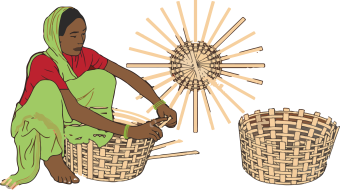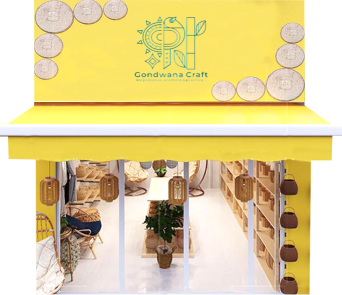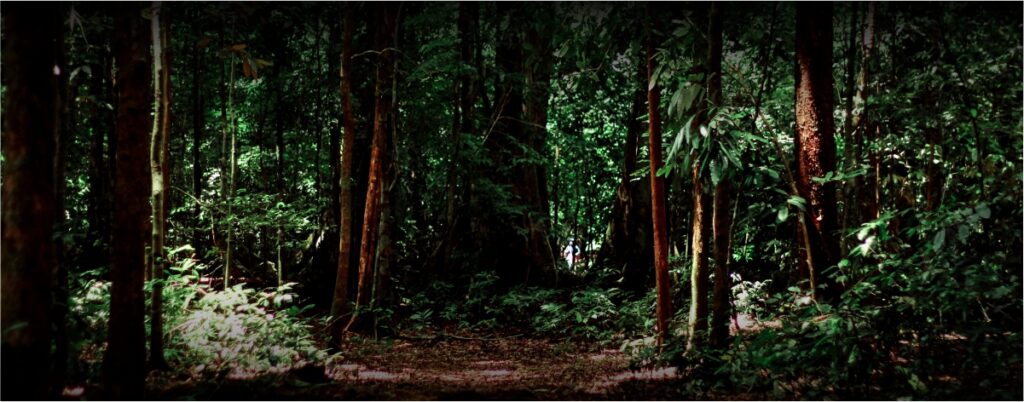From the CPO's Desk
Empowering Local Communities through Rural Entrepreneurship

Science and Technology Resource Centre (STRC) plays a pivotal role in empowering the under-served communities of the heavily forested and largely tribal region of Gadchiroli, Maharashtra. STRC is driving a transformative change by blending traditional knowledge with modern technology to create sustainable livelihoods, particularly focused on strengthening micro-enterprises and small businesses. Key initiatives of STRC include:
Fostering Rural Entrepreneurship around Bamboo →

Aimed at transforming locally available bamboo into high-value products, skilling local artisans and promoting entrepreneurship around bamboo based lifestyle-utility products.
Through the Undergraduate Diploma in Bamboo Entrepreneurship and Design, STRC equips students with essential skills in bamboo craft, product design, and business management. The program offers hands-on training to help students develop innovative bamboo-based products such as furniture, home decor, and construction materials, enhancing their employability in bamboo sector. Till date, over 200 jobs have been created for local artisans generating over INR 7.0 lakhs of revenue.
Gondwana Craft – A Gateway to Market Access →

To help rural artisans and entrepreneurs access wider markets, STRC has created an umbrella brand, Gondwana Craft, to preserve and promote unique yet dying traditional art forms of the region through a sustainable and viable social entrepreneurship platform. This physical and digital marketplaces in form of product outlets across nagpur and chandrapur and social media business platform, will showcase handcrafted goods from gadchiroli region and expected to provide artisans with an avenue to sell their products to the national and international audience. Such platforms are envisaged, not only to highlight the rich cultural heritage of the region but also to ensure fair pricing and enhanced returns, empowering rural entrepreneurs to grow their businesses sustainably. By exposing the local art-forms to the global markets, STRC is creating a powerful eco-system that supports artisan economy.
Fish Farmers’ Interest Groups (FIGs) as Units of Fish Business →

Considering the huge potential of fish farming as a sustainable livelihood option for local communities in the region, STRC has taken up good quality fish seed production through portable carp hatcheries. Constituting multiple cluster based FIGs, comprising of 25-30 small fish farmers, huge business opportunities can be created. Ensuring proper market linkages with large buyers and selling of live fishes in and around local market places will surely boost their income.
Reviving Traditional Healing Practices →

Focusing on reviving and promoting traditional healthcare practices, rooted in ancient wisdom of Ayurveda and indigenous medicinal knowledge through university platforms like Vaidya Chikitsalays, supports local traditional healers (Ths) to offer holistic health services in a dignified manner. This initiative not only creates opportunities to preserve traditional healthcare system but also help integrate it with modern healthcare solutions. It provides an avenue for local healers, to formalize their practices and create employment. Since its inception, in September 2022, nine THs associated with STRC Vaidya Chikitsalay, have successfully treated over 1800 patients.
Collectivization of Selected Non-Timber Forest Produce (NTFP) →

STRC’s NTFP Collectivization Project at Kharkadi, Dhanora is a vital community-led initiative involving a cluster of 10 villages, supporting 365 households. This project aims to generate sustainable livelihoods by facilitating the scientific collection and marketing of commercially important forest products such as honey, tori, kusum beej, raw bamboo, mohua seeds and flowers. The initiative emphasizes good storage practices, primary processing, and effective marketing strategies. The project has already completed its first cycle generating INR 3.25 lakh amount out of the total collection of 7.5 ton of forest produce. Gradually, a small primary processing unit would ensure development of multiple products and subsequent commercialization. This approach is designed to improve both the profitability and sustainability of NTFP sales, benefiting primary collectors and expanding market reach. The key focus of the project is on selling the collected produce, with STRC ensuring business linkages for sale of remaining stock and initiate collection of forest produce in the current cycle.

Fostering Rural Entrepreneurship around Bamboo
Aimed at transforming locally available bamboo into high-value products, skilling local artisans and promoting entrepreneurship around bamboo based lifestyle-utility products.
Through the Undergraduate Diploma in Bamboo Entrepreneurship and Design, STRC equips students with essential skills in bamboo craft, product design, and business management. The program offers hands-on training to help students develop innovative bamboo-based products such as furniture, home decor, and construction materials, enhancing their employability in bamboo sector. Till date, over 200 jobs have been created for local artisans generating over INR 7.0 lakhs of revenue.

Gondwana Craft – A Gateway to Market Access To help rural artisans and entrepreneurs access wider markets, STRC has created an umbrella brand, Gondwana Craft, to preserve and promote unique yet dying traditional art forms of the region through a sustainable and viable social entrepreneurship platform. This physical and digital marketplaces in form of product outlets across nagpur and chandrapur and social media business platform, will showcase handcrafted goods from gadchiroli region and expected to provide artisans with an avenue to sell their products to the national and international audience. Such platforms are envisaged, not only to highlight the rich cultural heritage of the region but also to ensure fair pricing and enhanced returns, empowering rural entrepreneurs to grow their businesses sustainably. By exposing the local art-forms to the global markets, STRC is creating a powerful eco-system that supports artisan economy.

Fish Farmers’ Interest Groups (FIGs) as Units of Fish Business Considering the huge potential of fish farming as a sustainable livelihood option for local communities in the region, STRC has taken up good quality fish seed production through portable carp hatcheries. Constituting multiple cluster based FIGs, comprising of 25-30 small fish farmers, huge business opportunities can be created. Ensuring proper market linkages with large buyers and selling of live fishes in and around local market places will surely boost their income.

Reviving Traditional Healing PracticesFocusing on reviving and promoting traditional healthcare practices, rooted in ancient wisdom of Ayurveda and indigenous medicinal knowledge through university platforms like Vaidya Chikitsalays, supports local traditional healers (Ths) to offer holistic health services in a dignified manner. This initiative not only creates opportunities to preserve traditional healthcare system but also help integrate it with modern healthcare solutions. It provides an avenue for local healers, to formalize their practices and create employment. Since its inception, in September 2022, nine THs associated with STRC Vaidya Chikitsalay, have successfully treated over 1800 patients.

Collectivization of Selected Non-Timber Forest Produce (NTFP)STRC’s NTFP Collectivization Project at Kharkadi, Dhanora is a vital community-led initiative involving a cluster of 10 villages, supporting 365 households. This project aims to generate sustainable livelihoods by facilitating the scientific collection and marketing of commercially important forest products such as honey, tori, kusum beej, raw bamboo, mohua seeds and flowers. The initiative emphasizes good storage practices, primary processing, and effective marketing strategies. The project has already completed its first cycle generating INR 3.25 lakh amount out of the total collection of 7.5 ton of forest produce. Gradually, a small primary processing unit would ensure development of multiple products and subsequent commercialization. This approach is designed to improve both the profitability and sustainability of NTFP sales, benefiting primary collectors and expanding market reach. The key focus of the project is on selling the collected produce, with STRC ensuring business linkages for sale of remaining stock and initiate collection of forest produce in the current cycle.






